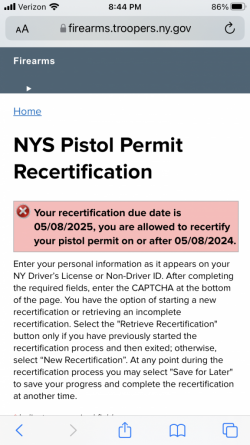Acer-m14
20×102mm Vulcan
I have to wonder how many judges and sheriffs will refuse to enforce the new laws KH is pushing.
none ..
Bob Lonsberry
Log into Facebook(THIS IS AN ANALYSIS OF THE NEW NYS GUN LAW BY THE LEGAL STAFF OF THE STATE SHERIFFS ASSOCIATION)
Sheriffs and Undersheriffs,
The legislature has been called back to Albany for an extraordinary session in order to pass legislation that will reform the pistol permitting process in New York, in the wake of the Bruen decision.
Here are the changes contemplated by the bill:
The "good moral character" eligibility requirement for all pistol permits (concealed or otherwise) will be defined in greater detail in the law.
Going forward it shall mean " shall mean having the essential character, temperament and judgement necessary to be entrusted with a weapon and to use it only in a manner that does not endanger oneself or others."
New requirements will need to be met specifically for concealed-carry permit applicants. An applicant for such a permit:
Cannot have been convicted of Assault 3rd, misdemeanor DWI, or menacing within 5 years prior to application
The applicant must meet in person with the licensing officer (i.e., the county court judge) for an interview
The applicant must submit to the licensing officer the names and contact information of the applicant's spouse, domestic partner and any other adults residing in the applicant's home, as well as indicate whether or not there are children living at the applicant's home, even part-time.
The names and contact information of 4 references who can speak to the applicant's good moral character, and who can also attest that the applicant has not made any statements or taken any action that would lead them to believe that the applicant would harm themselves or others.
Certification of completion of the new training requirement (more on this below)
A list of former and current social media accounts from the past 3 years, though the legislation does not require that the applicant provide access to these accounts.
Prior to the issuance of a concealed carry permit, an applicant must complete an "in-person live firearms safety course." Such course must be:
Conducted by a duly authorized instructor. This is currently defined in PL section 265.00 as a duly commissioned officer of the US Navy, Army, Marine Corp, or Coast Guard, or a qualified adult citizen who has been issued a certificate in small arms practice by any one of those branches or by DCJS.
At least 16 hours long
Covering those topics required by DCJS, which include things like general firearm safety, safe storage requirements, conflict de-escalations, best practices when encountering law enforcement, a minmum of 2 hours of live-fire range training, etc. PL section 265.20 would be amended to grant an exemption from prosecution for possessing a pistol without a license for the purposes of such training.
Current concealed carry pistol permit holders would need to complete this training course prior to their next recertification. It must only be completed once, not upon every subsequent renewal.
Concealed carry pistol permits will have to be recertified every 3 years, as opposed to the standard 5 years. Licenses that were issued over 3 years prior to the effective date of this legislation would have to be recertified within 1 year.
Licensing officers will be granted the discretion to revoke or suspend any license if the possessor engaged in acts that would have been grounds for denial of the granting of the license in the first place. Additionally, a licensing officer must revoke a license if it becomes know that the applicant made a materially false statement on his or her application. Denials, suspensions, and revocations of licenses can be appealed. These appeals would go to an "appeals board" that will be created by DCJS. DCJS in cooperation with the State Police, will be responsible for promulgating rules and regulations with regard to the operation of the board
The legislation also creates the crime of possession of a firearm, rifle or shotgun in a "sensitive location". This would be a class E felony. Police officers, peace officers, active-duty military personnel, and persons engaged in lawful hunting activity would be exempted. Sensitive places are defined as:
Federal, State and local government property
Any place that provides healthcare, mental health care, or addiction treatment services
Any place of worship or religious observations
Public parks, public playgrounds, zoos and libraries
Any place, or the location of any program, licensed, regulated, or operated by DOH, OASAS, OCFS, OMH or OPWDD.
Nurseries, preschools and summer camps
Homeless shelters, youth homes, family shelters, DV shelters, etc.
Schools of all education levels
Public transportation
Any establishment that serves alcohol
Entertainment venues such as stadiums, concert halls, racetracks, museums amusement parks, conference centers, etc.
Polling places
Any public sidewalk or property that restricted from general public access for a special event that has been issued a permit for the same
Any gathering of individuals to collectively express their constitutional rights to protest or assemble
Times Square
This legislation seems to reconstitute the ammunition sales database. "There shall be a statewide license and record database specific for ammunition sales which shall be created and maintained by the division of state police the cost of which shall not be borne by any municipality no later than thirty days upon designating the division of state police as the point of contact to perform both firearm and ammunition back- ground checks under federal and state law. "
The legislation would require that firearms dealers record all ammunition sales in the database. The records maintained in this database would not be subject to FOIL.
Firearm owners would have new safe storage requirements when leaving weapons in their vehicles. Guns left in a vehicle would first have to have the ammunition removed, and then the gun would have to be locked in a "safe storage depository" somewhere out of sight from outside the vehicle.
Furthermore, the home safe storage requirements would attach when an individual cohabitates with an individual under the age of 18, up from 16. Finally
DCJS will be tasked with conducting NICS checks for every firearm and ammunition purchase made in New York State:
“Upon receiving a request from a licensed dealer pursuant to section eight hundred ninety-six or eight hundred ninety-eight of the general business law, the division shall initiate a background check by (i) contacting the National Instant Criminal Background Check System (NICS) or its successor to initiate a national instant criminal background check, and (ii) consulting the statewide firearms license and records database established pursuant to subdivision three of this section, in order to determine if the purchaser is a person described in sections 400.00 and 400.03 of the penal law, or is prohibited by state or federal law from possessing, receiving, owning, or purchasing a firearm or ammunition.”
The effective date of all these provisions is somewhat convoluted. It will take a little bit of analysis to figure out what goes into effect when, but the general summary provided by the bill states:
This bill shall take effect September 1, 2022, provided to allow DCJS
additional time for implementation, some sections will go into effect
April 1, 2023.
We will have further follow-up for you once we have had more time to analyze the bill. It is expected that it will pass the legislature this evening, and will be signed shortly after.
Please do not hesitate to contact us if you have any questions or concerns. The full text of the legislation is below.
Alex Wilson
Associate Counsel
New York State Sheriffs' Association


